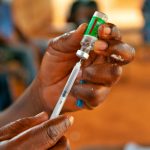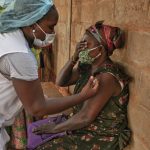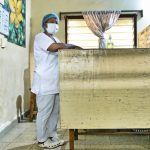To accompany the chaos and uncertainty described in AJ’s poems, we’ve used a photo by JC Johnson that isn’t technically a good photo. Taken in Budapest, Hungary, it’s the result of a camera that isn’t stabilized and a subject that’s moving too fast for the camera to capture in-focus. This usually happens in error, unintentionally—even to experienced photographers. Expert photographers don’t normally show such images to the public.
A COLLECTION BY AJ JOHNSON
At what point does size become impossible to conceptualize? When do numbers start to numb us rather than help us visualize the breadth of impact?
Earlier this year the Department of Government Efficiency (DOGE) aimed to trim the fat off bloated U.S. government spending. Led by the richest man in the world, DOGE slashed more than a quarter million federal jobs, crippled foreign aid programs like USAID, and by late April 2025, claimed to have saved the federal government at least $160 billion.
Numbers like these are difficult to grasp. Such impact is challenging to imagine.
This collection of eight poems by AJ Johnson illuminates the human cost of DOGE’s work. (Anthrow Circus published the first four poems two weeks ago.) A native of Togo, West Africa, Johnson carries the crystal-clear perspective of an outsider looking in. These poems cut through political jargon and conjure real men and women whose well-being has been jeopardized by American efficiency.
The genius of these poems—and of any work of literature, really—is that they make inscrutable data concrete. They clothe numbers in flesh. In so doing, Johnson’s poems press uncomfortable questions: What is the cost of saving money? How do we determine when efficiency should be our top priority? Are there equally effective but more careful ways to trim government expenses—ways that consider the vulnerable and marginalized and truly value life in all its stages?
While working among refugees and immigrants in the Chicago suburbs, I posted these words near my front door: “Give me the courage to not look away.” May that same spirit enable you to encounter the humans in these poems.
—Heather M. Surls, Anthrow Circus assistant editor
The Days Without Pills
Voice of an HIV-Positive Woman After the Suspension of PEPFAR Support
There is a rhythm to staying alive.
Wake. Swallow. Eat if you can.
Say thank you to the pink tablet
that keeps your blood from turning
into a time bomb.
Then one day,
they say the container won’t arrive.
Not because of war.
Not because of weather.
Because someone across the ocean
decided the program
was “not sustainable.”
That word—
like a curse spoken in policy dialect.
Sustainable for whom?
I counted the days
after the last dose.
Seven before the fever came.
Eleven before the nurse told me
she was sorry
and that I should avoid stress,
as if survival isn’t already
a full-time job.
I see them—
the mothers at the clinic gates,
pressing their babies close,
trying to believe in magic
since medicine has been reclassified
as optional.
A child named Blessing
used to color in the waiting room.
She liked drawing suns
with faces smiling.
She didn’t come last week.
Or this one.
I heard
300,000 gone.
Just a number on a screen
that no longer responds
to my touch.
They’ll say we are resilient.
As if resilience were a choice.
As if breathing through the rot
is anything more than desperation
dressed up in grace.
I do not hate the man.
The one who cut the funding.
But I wonder—
does he know
how quietly
a body can give up
when its immune system
is no longer allowed
to fight?
My son brushes my hair
and says I look like light.
I do not tell him
that the candle burns faster now.
We Used to Count Calories
Voice of a U.S. Humanitarian Officer in a Refugee Camp After WFP Support Was Cut
We used to count calories—
not to lose weight,
but to keep children alive.
Rice, lentils, fortified oil,
a formula they said
could sustain a family
for 17 days per ration.
Then one morning,
the formula vanished.
No memo.
No warning.
Only silence
where the shipment was supposed to land.
Now, I count children
too quiet for their age.
Mothers who whisper their grief
so the walls won’t hear.
The math has changed:
1 box of food = 100 lies
I didn’t mean to tell.
At the warehouse,
we rehearse apologies
as if tone can replace protein.
I tell them: Washington is reviewing budgets.
They tell me:
My daughter has started eating mud.
I saw a boy chewing pages
from the Bible we distributed
last month.
When I asked why,
he said,
I wanted to swallow something with hope in it.
We hung the flag
above the distribution tents.
Now I look at it
and wonder
how long a symbol can wave
before it wilts
under the weight of shame.
I still wear my blue vest.
Still mark the intake forms.
Still say we’re doing all we can,
though the can
has been taken,
emptied,
scrapped.
At night, I write reports.
They go into folders
no one will open
because hunger
doesn’t trend anymore.
We used to count calories.
Now we count
how many more lies
a conscience can hold
before it collapses.
Salt for Supper
Voice of a Refugee Father Unable to Feed His Family
Last night, I told them
salt was a feast.
I cracked it between my fingers
like the crust of old bread,
sprinkled it on water,
called it soup.
My youngest clapped.
He doesn’t know yet
what hunger should feel like.
But my eldest,
he stared through the cup
like it might answer
what I cannot.
They say the food trucks
are gone.
That a man in America
said it cost too much
to feed strangers.
I want to ask—
how expensive is the sound
of a child crying
because his stomach
has turned on itself?
I dig holes now,
not to plant,
but to pretend.
I let the children drop seeds
from their memories—
mango, cassava, even chocolate.
They wait.
They believe the ground
will give them back
what the sky has stopped sending.
My wife,
she has stopped asking.
She ties cloth around her waist
tighter each week.
Her ribs knock
like neighbors
asking if hope still lives here.
When the aid worker came,
I didn’t speak.
Not out of anger,
but because my words
cost more than they return.
I used to be a teacher.
Before war turned my lessons
into a suitcase
and my salary into ash.
Now, I carry nothing
but this shame—
that I cannot feed
what I created.
I tell them
salt is a feast.
But salt
is also
a wound.
Coda: What Remains After the Cut
They said it was about tightening belts—
but not their own.
Theirs remained polished, buckled,
resting on conference tables
where no one cried.
We know
what was cut.
It wasn’t just budgets.
It was the daily rituals of care,
the invisible hands holding up
tired bodies
and tired systems.
In the name of efficiency,
they turned off the wellspring.
The medicine shelf.
The satellite’s eye.
The ration line.
They called it necessary.
But necessity,
in its truest form,
has a pulse.
They never felt
the sound of hunger.
Of bones remembering
what it was like
to be warm.
Of hospital corridors
that no longer echo
because no one is left
to walk them.
Still—
the voices remain.
Not loud.
Not seeking applause.
But steady, like roots
beneath a hacked forest.
Voices that plant anyway.
That carry stretchers,
even when no one’s watching.
That offer a single grain of rice
as if it were a kingdom.
What remains after the cut
is not debris—
but witness.
And we—
we are the ones
who remember.
AJ Johnson is a freelance photojournalist and faith-based storyteller with over 10 years of experience reporting on culture, Christianity, and social change across sub-Saharan Africa. A trained sociologist, he has contributed to The Media Project, Anthrow Circus, and Christianity Today. He leads the African Child Photo and Film Project in his native Togo and is passionate about equipping youth to tell their own stories through photography and journalism. Beyond the lens and the field, AJ is a developing creative writer and poet. His creative work explores themes of justice, identity, freedom, and faith—offering fresh, authentic perspectives rooted in African experiences. He is currently working on several books and poetry collections designed to inspire, challenge, and amplify underrepresented voices in Africa and beyond. AJ’s work blends investigative depth with poetic insight, shining a light on stories often overlooked by mainstream media. Whether crafting a verse, capturing a moment through his camera, or mentoring young storytellers, he is driven by a vision to inform, inspire, and ignite redemptive change. AJ is fluent in the Ewe, Mina, and Anlon languages of West Africa as well as French and English.






